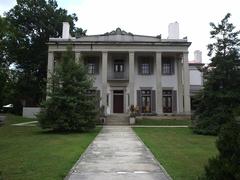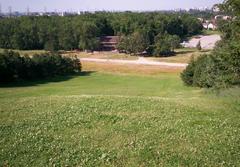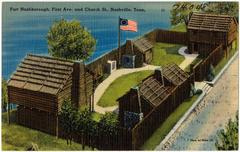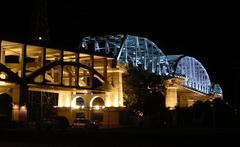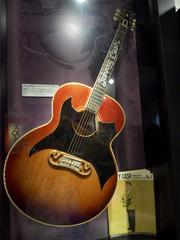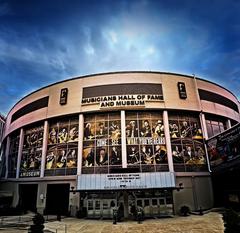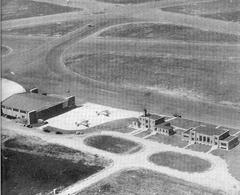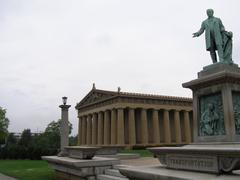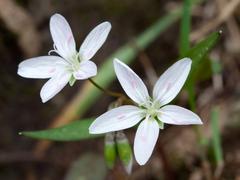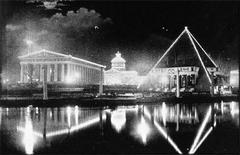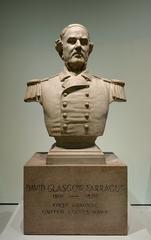Path of Volunteers: Visiting Hours, Tickets, and Historical Insights in Nashville
Date: 18/07/2024
Introduction
Discover the Path of Volunteers in Nashville, Tennessee, a landmark that embodies the state’s rich history and enduring spirit of service. This comprehensive guide will take you through everything you need to know about visiting this significant site, from its historical background and cultural relevance to practical details such as ticket information and travel tips. The Path of Volunteers serves as a testament to Tennessee’s legacy of civic duty and military service, tracing its roots back to the early 19th century when Tennessee earned its nickname ‘The Volunteer State’ during the War of 1812 (Battle of Nashville Trust). This spirit of volunteerism is commemorated through the Path of Volunteers, which honors the state’s contributions during key historical events including the Civil War and World Wars (Tennessee State Museum). The path is not only a historical landmark but also a cultural symbol, celebrating diverse contributions from Tennesseans, from Native American heritage to the Civil Rights Movement (Nashville.gov). Lined with sculptures, murals, and artworks, it hosts annual events and ceremonies, fostering a sense of community and remembrance. Whether you’re a history buff, an educator, or a tourist, our guide will help you make the most of your visit to this notable Nashville attraction.
Table of Contents
- Introduction
- History and Significance
- Visitor Information
- Educational Impact
- Preservation Efforts
- Community Engagement
- Future Developments
- FAQs
- Conclusion and Call to Action
History and Significance
Origins and Early History
The Path of Volunteers traces its roots back to the early 19th century, during the War of 1812. Tennessee earned the nickname ‘The Volunteer State’ due to the overwhelming number of volunteer soldiers who participated in the war, particularly in the Battle of New Orleans. This spirit of volunteerism is commemorated through the Path of Volunteers, which honors the state’s legacy of civic duty and military service.
Civil War Era
During the Civil War, Tennessee was a crucial battleground, and Nashville played a pivotal role due to its strategic location and resources. The Path of Volunteers highlights key events and figures from this period, including the Battle of Nashville, fought in December 1864. Detailed accounts of the strategies, outcomes, and impacts of the battle are featured along the path (Battle of Nashville Trust).
20th Century Developments
The Path of Volunteers expanded in the 20th century to include tributes to Tennesseans who served in World War I, World War II, the Korean War, and the Vietnam War. Notable additions include the World War II Memorial, honoring over 300,000 Tennesseans who served, including the 32,000 who lost their lives (Tennessee State Museum).
Cultural Significance
The Path of Volunteers is not only a historical landmark but also a cultural symbol of Tennessee’s spirit of service and community. Lined with sculptures, murals, and artworks, it celebrates diverse contributions from Tennesseans, from Native American heritage to the Civil Rights Movement. The path hosts annual events and ceremonies, such as Veterans Day parades and Memorial Day services, fostering a sense of community and remembrance (Nashville.gov).
Visitor Information
Path of Volunteers Tickets and Visiting Hours
The Path of Volunteers is open daily from 8 AM to 8 PM. Admission is free, making it accessible to all visitors. Guided tours are available upon request, and special tours can be arranged for school groups and large parties.
Travel Tips and Nearby Attractions
The Path of Volunteers is conveniently located near other notable Nashville attractions, such as the Tennessee State Capitol and the Bicentennial Capitol Mall State Park. Consider visiting these sites to enrich your historical exploration of Nashville (Visit Music City).
Accessibility
The path is designed to be accessible to everyone, with paved walkways, informative signage, and seating areas for reflection. Audio guides and mobile apps enhance the visitor experience by providing detailed narratives and historical context.
Educational Impact
The Path of Volunteers serves as an educational resource for both locals and tourists. Schools frequently organize field trips, and the path offers interactive exhibits and guided tours that align with state curriculum standards. Resources for educators, including lesson plans and multimedia materials, are available to enhance classroom learning (Tennessee Department of Education).
Preservation Efforts
Preserving the Path of Volunteers is a collaborative effort involving local government, historical societies, and community organizations. These groups work together to maintain the path’s condition and historical accuracy, ensuring it remains a valuable resource for future generations (Historic Nashville Inc.).
Community Engagement
The Path of Volunteers is a focal point for community engagement and volunteerism in Nashville. Local organizations host events and volunteer opportunities, encouraging residents to contribute to its upkeep and programming. These activities strengthen community bonds and promote shared heritage (Hands On Nashville).
Future Developments
Future enhancements to the Path of Volunteers include new exhibits focusing on contemporary issues and modern-day volunteers. These updates aim to keep the path relevant and engaging, ensuring it continues to inspire and educate future visitors (Nashville Civic Design Center).
FAQs
Q: What are the Path of Volunteers visiting hours?
A: The Path of Volunteers is open daily from 8 AM to 8 PM.
Q: Do I need tickets to visit the Path of Volunteers?
A: Admission is free, and no tickets are required.
Q: Are guided tours available?
A: Yes, guided tours are available upon request, and special tours can be arranged for school groups and large parties.
Conclusion and Call to Action
The Path of Volunteers in Nashville is a testament to Tennessee’s rich history and spirit of service. With comprehensive exhibits, educational programs, and community engagement efforts, the path offers a meaningful and memorable experience for all who visit. Plan your visit today and explore one of Nashville’s most significant historical sites.
Stay up to date with our latest events and updates by following us on social media and visiting our official website.
